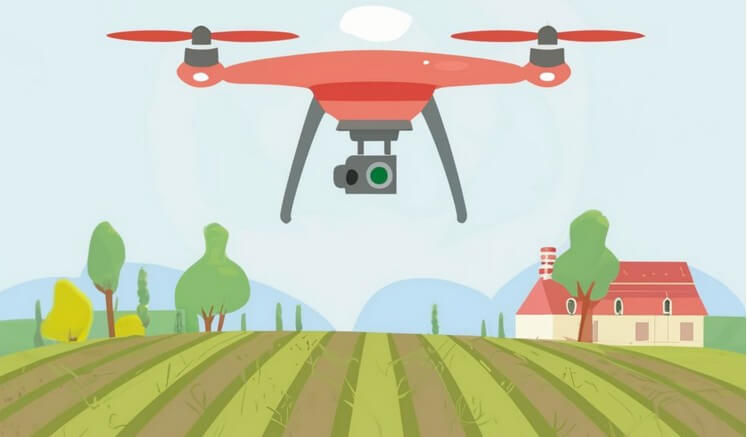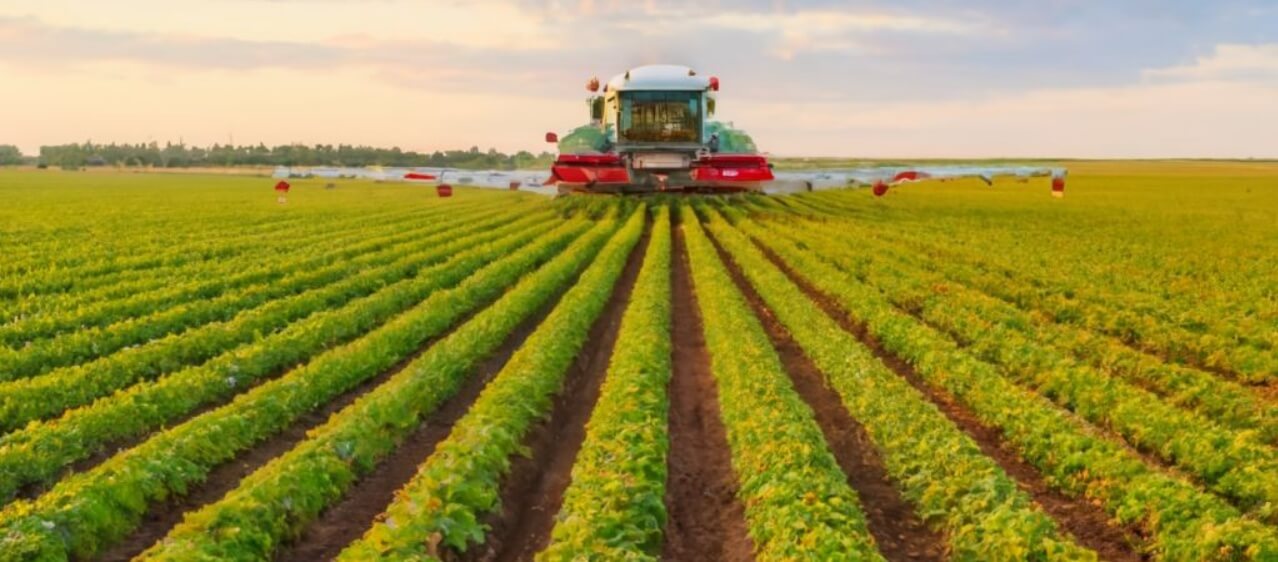The integration of Artificial Intelligence (AI) and Robotics has revolutionized the field of agriculture, providing unparalleled opportunities to increase efficiency, sustainability, and productivity. With the global population overgrowing and agricultural challenges becoming more complex, it is becoming increasingly clear that technological solutions are necessary. This paper explores how AI and robotics are integrated into agriculture, focusing on their transformative impact on precision farming, crop management, harvesting, and supply chain dynamics. By shedding light on the crucial role played by these technologies, this discourse aims to provide a nuanced understanding of the potential benefits and challenges of their integration into the agricultural landscape. [Related article: AI & Robotics]

Artificial Intelligence Robotics in Agriculture
Here are some key areas where AI and robotics are making an impact in agriculture:
- Precision Farming: Precision farming is a groundbreaking approach that utilizes Artificial Intelligence (AI) to enhance agriculture by optimizing various processes. The AI algorithms analyze vast amounts of data, including satellite imagery, weather patterns, and soil samples, to provide predictive models for informed decision-making. From precision planting that considers soil health and weather conditions to crop monitoring using drones equipped with AI for identifying diseases and pests, AI plays a crucial role in agriculture. Automated machinery and robotics, driven by AI, streamline tasks such as planting and harvesting, while IoT integration ensures real-time monitoring of environmental factors. By optimizing resource usage, AI minimizes waste and environmental impact. The decision support systems offer farmers actionable insights, weather predictions help in risk management, and supply chain optimization ensures efficient delivery of agricultural products. The continuous learning capability of AI allows for iterative improvements over time, contributing to more sustainable and productive agriculture practices globally.
- Crop Monitoring and Management: Crop monitoring and management in agriculture have been significantly transformed by integrating artificial intelligence (AI). AI technologies like machine learning and computer vision are vital in optimizing agricultural practices. By leveraging satellite imagery, drones, and sensor data, AI enables real-time crop health monitoring, identifying potential issues such as pests, diseases, or nutrient deficiencies. Machine learning algorithms analyze vast datasets to provide accurate predictions and actionable insights, empowering farmers to make informed irrigation, fertilization, and pest control decisions. This enhances overall crop yield and promotes sustainable farming practices by minimizing resource usage. The seamless integration of AI in crop monitoring and management represents a technological leap that empowers farmers to achieve greater efficiency and precision in their agricultural operations.
- Weed and Pest Control: Robotic systems using AI algorithms can identify and selectively target weeds and pests without chemical sprays. These systems can distinguish between crops and unwanted plants, reducing the use of herbicides and pesticides while minimizing environmental impact.
- Harvesting Automation: AI technologies, such as machine learning and computer vision, are enabling the development of sophisticated harvesting systems. These systems can autonomously accurately identify and harvest crops using advanced algorithms to analyze data from sensors and cameras. This allows the system to differentiate between ripe and unripe fruits or vegetables. Harvesting automation operates 24/7, accelerating the harvesting process, reducing labour costs, and minimizing waste by optimizing harvest timing. Integrating AI in harvesting addresses labour shortages and contributes to sustainable agriculture practices by optimizing resource utilization and minimizing environmental impact.
- Autonomous Tractors and Machinery: Autonomous tractors and other machinery, powered by the latest advancements in artificial intelligence (AI), are transforming the agricultural industry by improving efficiency and sustainability. These intelligent machines (Smart Machines) use a combination of sensors, machine learning algorithms, and real-time data processing to carry out tasks like planting, harvesting, and ploughing with unparalleled accuracy. AI allows these autonomous systems to adjust to changing field conditions, optimize resource usage, and reduce environmental impact. By eliminating the need for constant human intervention, autonomous tractors contribute to increased productivity, decreased labour costs, and more eco-friendly farming practices. The integration of AI technology in agriculture streamlines operations and has the potential to address the challenges of feeding a growing population while minimizing the ecological effect of farming activities.
- Predictive Analytics and Decision Support: Predictive analytics uses advanced AI algorithms and machine learning models to analyze large datasets and uncover patterns, trends, and correlations. This enables organizations to anticipate future outcomes with unprecedented accuracy, empowering decision-makers to make informed and proactive choices, mitigate risks, and capitalize on opportunities. AI enhances this process by continuously learning from new data, refining predictions, and adapting to dynamic environments. The synergy between predictive analytics and AI enhances decision-making precision. It transforms decision support into a dynamic and adaptive framework essential for navigating the complexities of modern business landscapes. As a result, organizations can optimize resource allocation, streamline operations, and gain a competitive edge by staying ahead of the curve.
- Indoor Farming and Vertical Agriculture: AI technologies are extremely useful in optimizing agricultural processes. They can be used for monitoring environmental conditions and fine-tuning irrigation and nutrient delivery systems. Using smart sensors and AI algorithms, controlling factors like temperature, humidity, and light is possible, which helps create optimal conditions for plant growth. Vertical farming is an excellent example of a space-efficient design that allows for the cultivation of crops in stacked layers, maximizing yield per square foot. AI-driven data analytics can enhance decision-making by predicting crop performance, identifying potential issues, and suggesting real-time adjustments. This synergy between indoor farming, vertical agriculture, and AI boosts productivity and resource efficiency and promises sustainable food production year-round. It addresses the challenges traditional farming methods pose in the face of a growing global population and climate uncertainties.
- Supply Chain Optimization: Artificial intelligence has revolutionized supply chain optimization, enabling organizations to manage the flow of goods and services more efficiently and with greater adaptability. AI technologies, such as machine learning and predictive analytics, allow companies to analyze vast amounts of data in real time, identify patterns, and optimize decision-making processes. By incorporating AI into supply chain management, businesses can improve demand forecasting, reduce inventory holding costs, and streamline logistics operations. Automation of routine tasks, such as order processing and inventory management, minimizes human errors and enhances overall accuracy. Furthermore, AI-driven algorithms can dynamically adjust supply chain strategies based on market trends, disruptions, or changes in customer preferences, ensuring a more responsive and resilient supply chain ecosystem. In conclusion, integrating AI in supply chain optimization empowers businesses to navigate complexities, mitigate risks, and achieve higher operational excellence.

Related articles: AI Seminar Topics
The combination of artificial intelligence and robotics in agriculture offers a promising and innovative solution. Precision farming practices maximise resource utilization, while autonomous machinery increases efficiency. This technological evolution in agriculture is profound and crucial as we face environmental challenges and a growing global population. However, it is essential to be mindful of this transformative wave’s ethical, social, and economic implications. A reasonable adoption and continual refinement approach will create a resilient, productive, and sustainable agricultural ecosystem for future generations.
Robotics Topics: Robotics (Collegelib articles for Seminars and projects)
AI Topics: Artificial Intelligence Topics
This article was initially published on Collegelib in 2024.